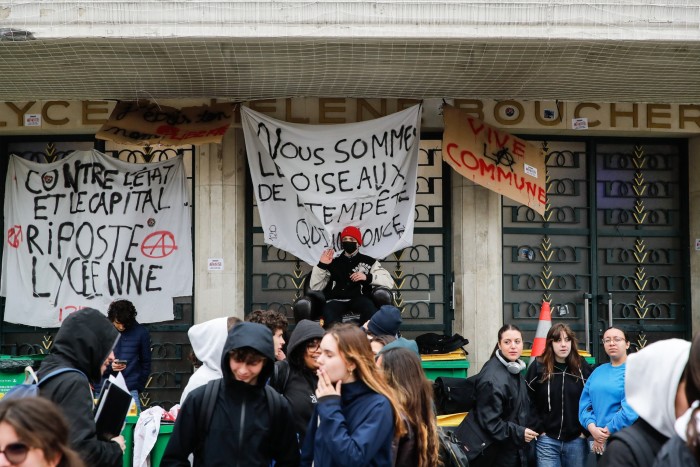[ad_1]
French officials expect three times more young people to join the protests on Tuesday against President Emmanuel Macron’s unpopular plan to raise the retirement age, raising the stakes for the police as they try to prevent a repeat of the chaotic scenes that marred the last demonstrations.
“Some young people, who initially did not feel affected by the reform, have joined the movement . . . and they will be out in the streets early in the morning to block their schools, then more at the demonstrations,” predicted an intelligence assessment obtained by Europe 1 radio and confirmed by the interior ministry.
In a sign of the growing mobilisation of young people, some universities and high schools were closed on Tuesday after having been “blocked” by student activists. Nine campuses were blocked in Paris, according to the UNEF student union, and at least 10 in cities such as Toulouse and Nice. Outside Tolbiac university in Paris, students piled up electric scooters and waste bins to block entrances and daubed slogans against pensions reform on walls.
The move by Macron’s government this month to trigger the 49.3 clause of the constitution and pass the draft pensions law without a parliamentary vote has breathed new life into a protest movement that has built since January. On Tuesday, strikes continued at petrol refineries, primary schools and among rubbish collectors, while one-fifth of flights were cancelled at Paris Orly airport and just under half of domestic high-speed trains.

Macron has ruled out pulling the reform, which he argues is necessary to ensure the viability of the pension system in an ageing population, given that it relies on active workers to finance the benefits of retirees. The law, which requires approval from the constitutional court before it can be enacted, will raise the retirement age from 62 to 64, and require people to work for 43 years (instead of 41) to receive a full pension.
Téo Soler, 23, a social sciences student at Paris Dauphine university, which was barricaded on Monday, said the use of the 49.3 clause was “like an electric shock” for students. “It politicised a lot of students who had followed the pensions situation more or less from afar.”
Students were initially more concerned by rising living costs and job insecurity, rather than pensions, but anger over these issues boiled over when the reform was pushed through, while widespread arrests at recent protests further galvanised some, according to several student union leaders.
“If Macron was hoping to calm things down, he’s really not going about it the right way,” said Éléonore Schmitt, a political science student and national secretary for L’Alternative union.
The wave of public anger has also made it harder for labour unions, which had led a series of largely calm demonstrations that attracted millions, to control the movement. More radical activists, who the government refers to as “ultra left” or Black Blocs for their clothing and masks, were present in larger numbers at the last nationwide demonstrations on Thursday. They clashed with police and set fires, leading to 457 arrests.

The government has begun to worry that the swelling ranks of young people in demonstrations, paired with the radical elements, increases the risk of injuries or even deaths. At an unrelated protest on Saturday over an agricultural reservoir, two activists were gravely injured in clashes with police and remain in a critical condition in hospital.
Several French groups and international organisations such as Amnesty International have sounded the alarm about the tactics of French police. Dunja Mijatović, the Council of Europe’s commissioner for human rights, on Friday said the conditions surrounding the protests were becoming “worrying” and warned that police should not use “excessive force” or deprive people of their right to protest.
Officials at the Élysée Palace have been reaching out to labour unions in an effort to find ways to ease the crisis. But the government has not accepted their proposal to put the reform, including the increase to the retirement age, “on pause”, to allow for calm to return to the streets.
On Tuesday Laurent Berger, leader of the moderate CFDT union, proposed creating a “mediation” process led by neutral parties. “We should take a month or two to ask a handful of people to mediate,” he said on France Inter radio, in what would be “a gesture to bring back calm”.
Government spokesman Olivier Véran rejected the idea, however. “There is no need for mediation when we can talk directly,” he said.
[ad_2]
Source link

